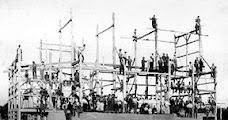Wednesday September 19, 2012 A letter I sent to my students some time ago touches on the important issue of frustration during group work. How can we learn to be more comfortable in the "groan zone"—that time in group work where the conversation seems all over the place? "…As we discussed, we identified several issues that had prevented the group from making real progress as far as sharing and building new knowledge. The first issue that all of you have identified is the lack of purpose and the frustration that this causes you. Frustration comes from the Latin word frustra, which means 'useless.' I ask: was that moment in the conversation really useless? Is the frustration with the apparent lack of purpose of that part of the conversation simply the inability to deal with the time in group work called the 'groan zone'? Let me recap: we were talking about something very important. The questions on the floor were:
• Is authority tasked to do the work of change?
• What is the job description of a change agent?
• What role is most effective to play in an organization in order to change it? All great points on very juicy issues. Yes, I could have intervened and told you =my opinions, but would that have helped? Paradoxically, I am not so interested in the content here, but more in developing the ability of each and every one of you to 'learn how to learn' from a group discussion. So the question becomes: what are ways in which we can manage the frustration of the groan zone in service of more effective group work? Three things to do to thrive in the "Groan Zone" I have suggested that you bring a different attitude to the conversation, that you slow it down by paraphrasing each other's point ('John, so you are saying that……' 'Liz, your point is' …. 'Have I missed something?') and that you work to acknowledge reality first and foremost. Different attitude. Would you rather win or learn? The point of a competitive discussion is "I win, you lose." If we bring to the conversation a different purpose ("I learn, you learn"), what would happen then? How do we change this? With intellectual humility. I would love to see this in action in our class! Without renouncing to advocating our own positions all together, but mixing it with them! Slow down the conversation. A second thing might be to recognize our defensiveness in action. We talked about the ladder of inference. Conflict is often the result of people dueling at high level of inferences and never recognizing that they do that. Catch yourself being hurt, cover up that you are being hurt, and creating a reaction to all this with a statement. This added level of awareness to your action is sure to be the best leadership lesson you might have learned in our class. Reality first. Ultimately making a difference by taking on a tough problem to make progress is done acknowledging reality. We have to acknowledge the forces at play in reality, the role that we all play in making it so, name a different reality and – in courageous conversations - calling spade a spade. This act is in itself a needed act of leadership in today's organizations. On this subject, here is a nursery rhyme from Dylan's book that describe what I am saying here: "There was a crooked man and he walked a crooked mile,
He found a crooked sixpence upon a crooked stile.
He bought a crooked cat, which caught a crooked mouse.
And they all lived together in a little crooked house." Aren't today organizations so often "little crooked houses"? Leaders need to acknowledge the true reality of the organizations where they operate. Do not become "crooked" because you work in a "crooked organization". Reality first. | ![]()





